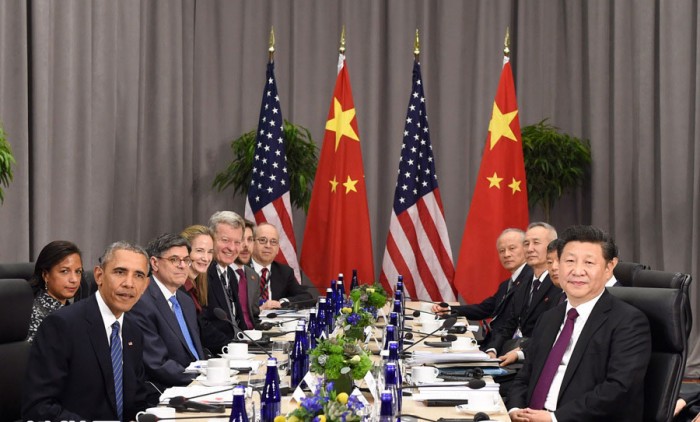Media Report

- The New York Times reports: "President Obama refused to bash China when he ran for the White House in 2008, which set him apart from other candidates. None of Mr. Obama's would-be successors are showing similar restraint. Some, like Donald J. Trump, are bashing Beijing with gleeful abandon....The surge in anti-China sentiment on the campaign trail will cast a shadow over the Obama-Xi meeting, and it could have ominous consequences for China's relationship with the United States after Mr. Obama leaves office. Experts on China said the Chinese were taking the vitriol more seriously than in previous elections, viewing it as a gauge of American intentions."
- The Washington Post reports: "The leaders of China, India, Japan and South Korea are among the heads of government converging on Washington for a summit on countering the nightmarish threat of nuclear terrorism. But with tensions in North Korea and the South China Sea running high, the meetings that Asian leaders have on the sidelines could attract more attention than the summit itself. President Barack Obama has put a premium on expanding ties with Asia, in part to counter the rise of China. The U.S. has deepened ties with India, and strengthened long-standing alliances with Japan and South Korea while prodding these two core East Asian allies to overcome their historical differences."
- The Financial Times reports: "A new generation of Chinese intercontinental ballistic missiles may come into service as early as this year and will herald a period of rapid nuclear build-up by China, according to experts. With a 14,500km estimated range, the DF-41 is the first Chinese missile capable of carrying multiple warheads that can strike any part of the US from anywhere in China. Previous missiles have been more limited....The news comes as US President Barack Obama prepares to meet China's President Xi Jinping at a nuclear security summit in Washington on Thursday."
Calendar
- 2016-03-30 U.S. hopes China will agree to talk about South Korea missile defense
- 2016-03-29 The latest destination for China’s billions: U.S. hotels
- 2016-03-28 China Sees Industrial Profits Grow at Start of 2016
- 2016-03-23 Indonesia rebuffs China’s demand that fishermen be released
- 2016-03-22 China Vaccine Scandal Prompts Angry Backlash From Parents and Doctors
- 2016-03-21 Exclusive: China central bank to Fed: A little help, please?
- 2016-03-20 China's Finance Minister Brushes Off Concern Over Outlook Cut
- 2016-03-18 Exclusive: U.S. sees new Chinese activity around South China Sea shoal
- 2016-03-17 With Gambia move, China ends diplomatic truce with Taiwan
- 2016-03-16 The U.S. is heading toward a dangerous showdown with China
News
- The New York Times Campaign Season's Anti-China Tone Is Likely to Cloud Meeting With Obama
- The Washington Post AP Explains: Why Asian diplomacy is on nuke summit sidelines
- The Financial Times China set to deploy longest-range nuclear missile
- The Wall Street Journal McDonald's Plans to Add More Than 1,000 Restaurants in China
- Reuters China says no need to 'gesticulate' over South China Sea plans
- The New York Times Activist Says China Didn't Allow Her to Receive Award in U.S.
- The Washington Post How China fell for a Rothschild. No, not one of those Rothschilds.
- Bloomberg Business China Rating Outlook Cut at S&P on Risk of Slower Rebalancing
- Reuters China says U.S. has 'ulterior motives' in award to rights lawyer
- The Wall Street Journal Chinese Stocks Edge Higher
- Reuters China sets up unit to coordinate overseas military moves
- Bloomberg Business Chinese Stocks in Hong Kong Enter Bull Market; Shanghai Rebounds
- CNBC S&P cuts China, Hong Kong outlook to negative
Commentary
- The New York Times: Sinosphere One Envoy's Take on China's Hardball Diplomacy
- Foreign Policy The China Market Status Dilemma
- The National Interest Does China Need Allies?
- The New York Times: The Opinion Pages Expect Some Change in China's Policy Toward North Korea But Not a Lot
- Foreign Policy A 'Lost' Daughter Speaks, and All of China Listens
- The Diplomat Why ASEAN Must Remain Neutral on the South China Sea
- The Economist Beware the cult of Xi
